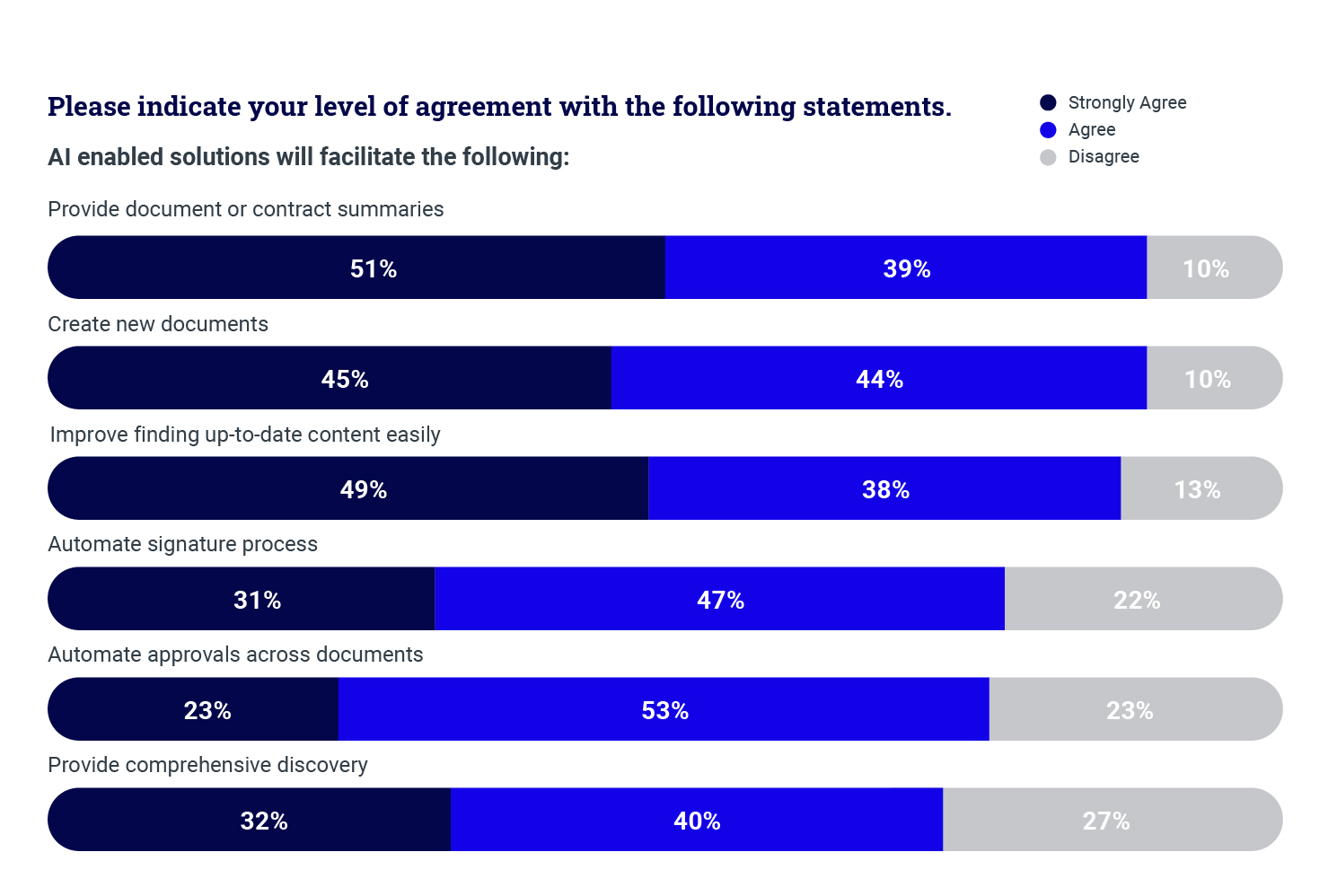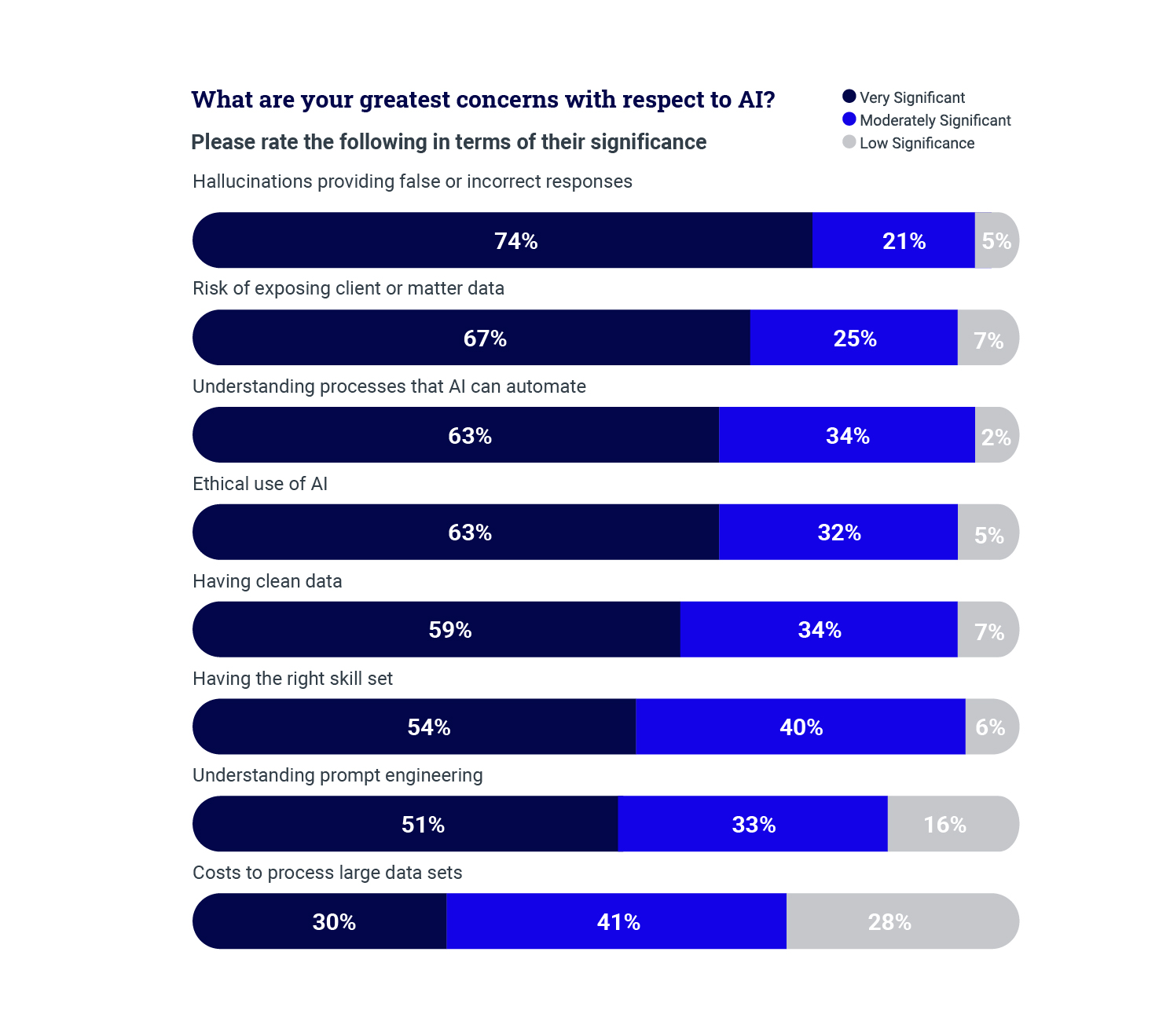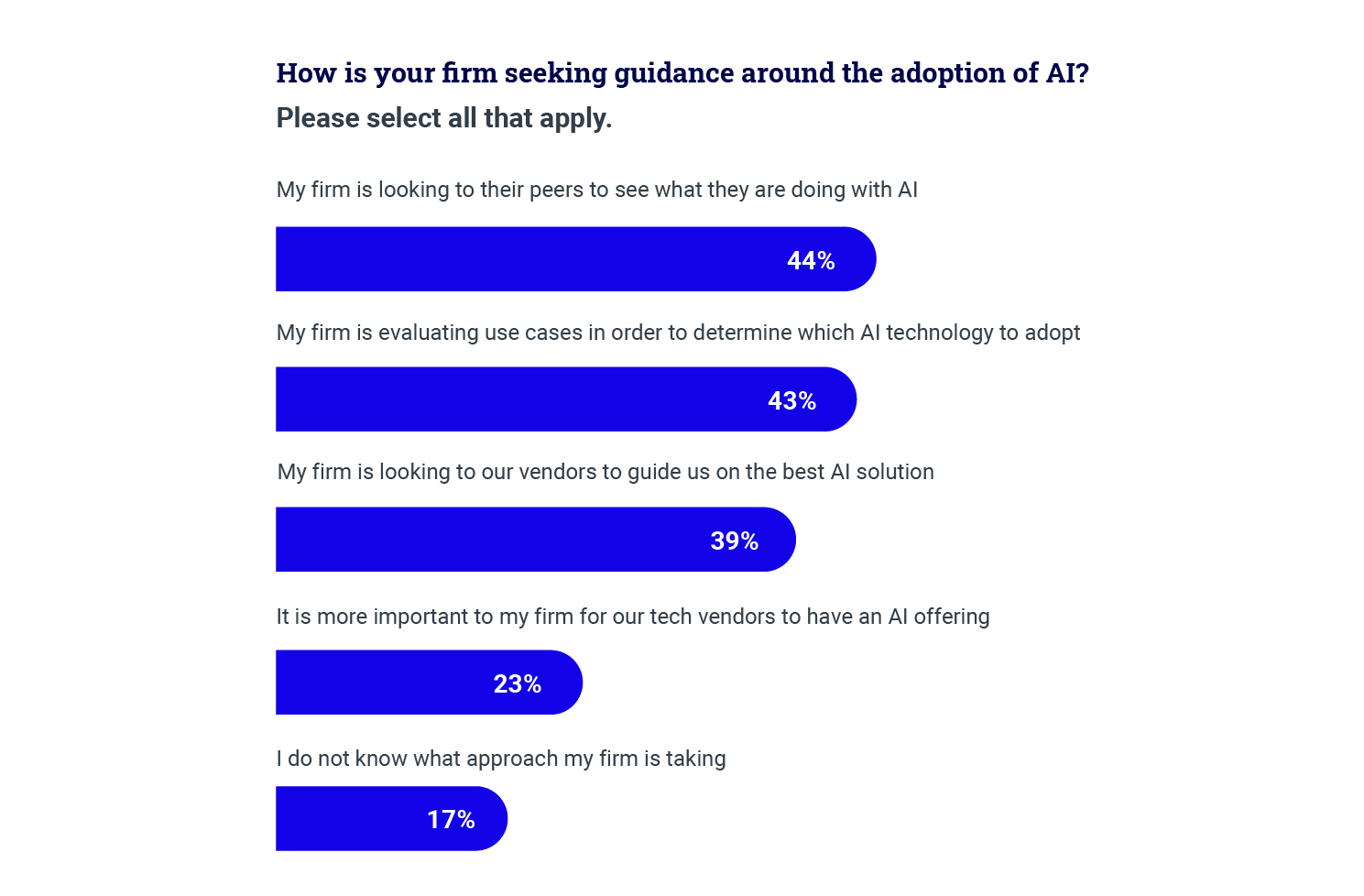Small firms seek balanced approach to AI: build on strengths, mitigate risks
Small law firms stand to benefit greatly from adopting AI-enabled solutions that increase efficiency and lower costs, helping them level the playing field with larger competitors. But caveat emptor — if not thoughtfully and carefully implemented, any tool can produce unwanted outcomes. Human oversight and ethical compliance are critical and will remain critical to making practical and strategic use of these new technologies.
“… small law firms can use Gen AI to gain access to scale and competitive abilities unheard of before in the legal industry."
Mark Haddad, Thomson Reuters Institute, Generative AI and the small law firm: The value of legal domain expertise
Embrace the benefits, but avoid the pitfalls
AI-enabled solutions promise to deliver on two big goals for most law firms — increasing efficiency and lowering costs. Opportunities to boost profitability and improve client service run the gamut, from automating routine tasks such as email management to summarizing documents to extracting important data to expedite legal research.
"For smaller firms, Gen AI technologies will increasingly be embedded in the products they use. If a firm deploys those products effectively, it is deploying AI."
Gregg Wirth, Thomson Reuters Institute, Generative AI and the small law firm: First steps for firm leaders
By using AI-driven tools, your firm can increase capacity without increasing staff. And by handling more clients and more complex cases without increasing costs, you can level the playing field with larger competitors. So far, so good. But these benefits are not without risks.
Like any tool, AI can produce unacceptable outcomes if it is not thoughtfully and carefully implemented. Concerns around data security, ethical compliance, and accuracy go hand in hand with the application of generative AI in legal, where inaccuracies or unintentionally biased information can impact case results and even harm a firm's hard-earned reputation. And, needless to say, client data and confidentiality must always be safeguarded when AI-generated content is used.
The key for small law firms is to take a balanced approach to AI that builds on your strengths while minimizing the inherent risks. For long-term success, human oversight and ethical compliance are critical to realizing the promise of AI-driven efficiency in a rapidly evolving legal landscape.
Small firms see practical and strategic use cases for AI
A substantial majority of respondents to our recent Above The Law survey acknowledge the potential advantages of artificial intelligence for their business. They believe AI will facilitate all six use cases presented, with the strongest showing (90%) in the areas of summarizing documents or contracts or creating new documents.

Considering the level of ambition we see in smaller firms to take advantage of the promise of AI, it may be a relief to know that the most helpful AI use cases for a small firm are not "pie-in-the-sky," highly innovative, complex, or expensive customized applications. Entry-level AI is used by many law firms every day to perform simple tasks more efficiently. This empowers small, boutique, or specialty firms lacking extensive support staff to up their game — without huge investments in capital, time, or personnel.
Integrating AI into your practice starts with automating routine tasks to elevate productivity and free lawyers and other legal professionals to focus on more complex or satisfying legal work. It also gives firms with limited resources an edge over the competition by reducing the cost of operations.
Analyzing large volumes of data with speed and accuracy could be the next application for firms that aspire to provide more comprehensive and timely advice to their clients. Improved responsiveness and more personalized interactions strengthen client relationships and overall satisfaction.
Whether AI is the problem or the solution depends on you
However bullish small firms may be on the promise of AI, cybersecurity and ethics remain top of mind. Firms may be excited about the potential rewards and may even be testing the water, but they aren’t sure they can trust it. False responses due to hallucinations, protecting client data, and getting a better understanding of how AI can help are top concerns.
Although over-reliance on AI could lead to decisions not fully aligned with your firm’s standards or guidelines, we can also argue that, with careful application, AI solves or prevents the very problems it is perceived as causing, along with creating, the desired benefits. How?

The surest route to ensuring that client data and firm integrity are safe in an AI-driven workflow is to vet solutions that have advanced, proven security features built in.
Dipping a toe in, riding the wave, or decidedly undecided
As use cases for AI technologies proliferate, some segments race forward, make mistakes, and learn. But a “fail fast” mentality is not generally viewed as viable in the legal segment, where the pressure to protect business interests is felt as keenly by small or specialized firms as midsize or large law firms.
Time is also precious to smaller firms, and prioritizing tech adoption over client work, particularly for firms that do not have a dedicated technology resource, can be a non-starter. No one wants to back a project whose outcome and ROI seem uncertain in the face of a rapidly changing legal landscape. The margin for error is too small.
And yet, we see corporate legal departments onboarding boutique and specialized law firms for their unique specialties. This elicits a “FOMO” reaction in leaders hoping to win new business and pumps up the pressure to embrace advancing technologies.
So, despite some apprehension, small firms are not dismissing AI adoption. Survey respondents overwhelmingly indicate that none of these concerns make effective technology adoption any less critical to a small firm's long-term success. Rather than sit back and wait for a clear path, they are seeking guidance from trusted sources.
Seeking industry guidance around AI adoption
Respondents' primary ways of seeking guidance around AI adoption are watching peers’ actions (44%) and evaluating use cases (43%). Many also rely on outside sources (such as tech vendors) in their approach to AI adoption.

Individual responses reveal a greater variety of means than the survey responses allow, including:
- Consulting with technology experts and legal tech consultants
- Attending industry conferences and seminars on AI in legal practice
- Collaborating with larger firms or networks for shared insights
- Engaging with professional associations for best practices and guidelines
- Participating in pilot programs to test AI applications
- Seeking advice from bar associations and regulatory bodies
- Reading industry publications and case studies on AI adoption
This sheds additional light; put simply, they are leaving no stone unturned. And that is all for the good, as information is key to empowering legal leaders to make the best decisions for their firms.
Careful consideration and strategic implementation prevail
“55% of legal professionals expect using AI will lower costs for firms and drive greater firm profitability.”
Small, specialized, and boutique law firms do recognize the transformative potential of AI in enhancing efficiency, reducing costs, and improving client service. They are navigating AI adoption in all its complexity with cautious enthusiasm. They seek expert guidance, participate in pilot programs, or partner with a trusted legal technology vendor, sometimes all of the above.
Staying informed through industry connections is a crucial strategy for firm leaders as they negotiate the delicate balance between embracing innovation and preserving practice integrity. Their peers, larger firms, and trusted consultants or vendors serve as guides, while careful deliberation provides the guardrails.
Choosing and adopting effective technology has become a necessity for small law firms that aspire to long-term success in an increasingly competitive legal landscape, and iManage is here to help. With advanced security and AI technology built into our trusted cloud-native platform, iManage is making knowledge work™ for firms like yours every day. Watch a video, read an ebook, or — better yet — schedule a demo today.


Laura brings a global perspective to legal technology, helping knowledge professionals build confidence in AI. Through user insights and trend analysis, she identifies core challenges and translates them into benefit-driven narratives that show how tools like Ask iManage and Co-authoring reduce friction, enhance collaboration, and improve work quality.
Making Knowledge Work
Request a demo
Ready to see how iManage can make a difference to your organization?
Book a Demo